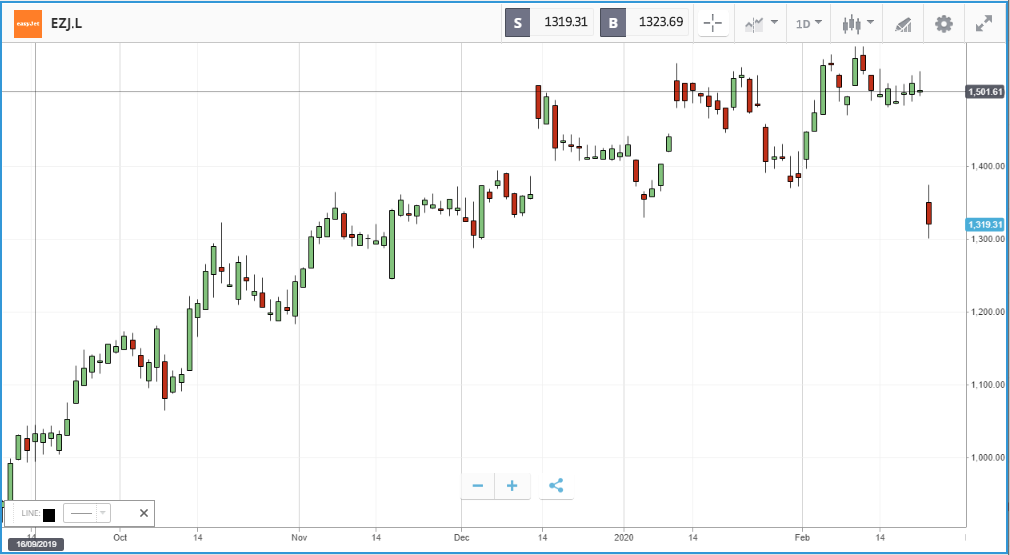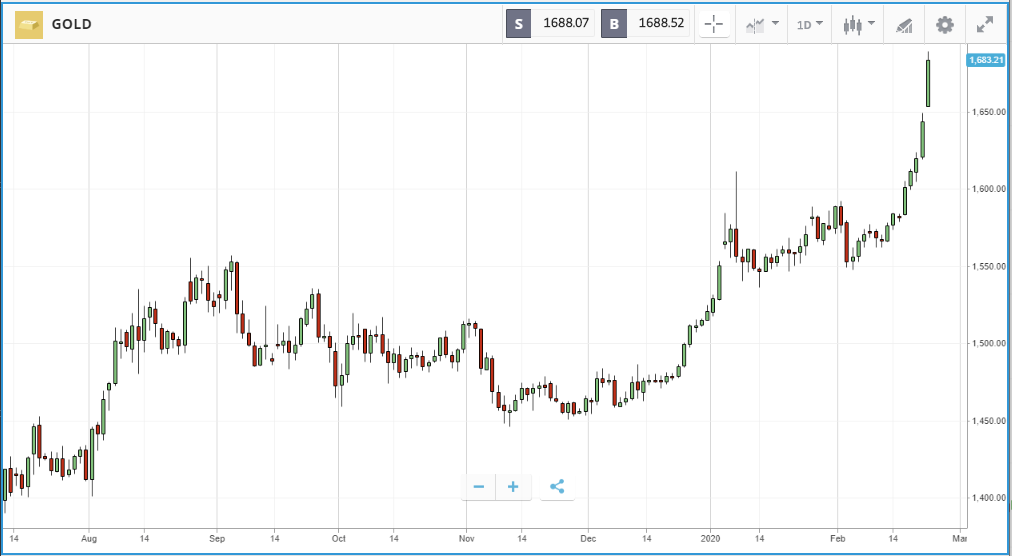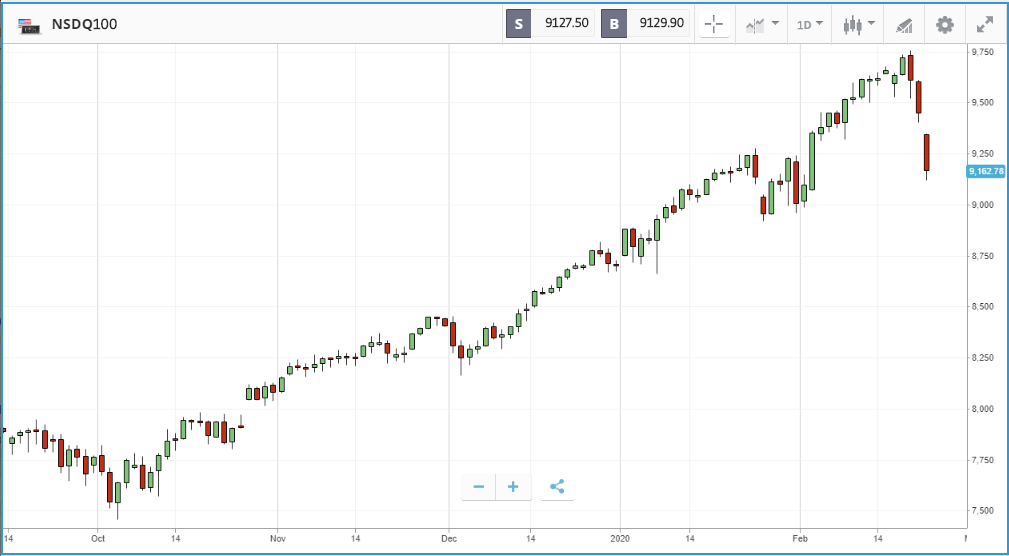Stocks Plunge As Virus Fears Grow
Markets are down heavily across the board this morning as investors seek safety due to a rise in coronavirus cases outside of China. Outside of Asia, we had seen markets almost carrying on with business as usual once the stimulus measures had been announced, however it is the spike in Italian cases which has caused concern the virus could now spread within Europe. The ‘out of sight out of mind’ approach clearly is no longer an option with the FTSE100 opening down 3.2%, Germany’s DAX down 3.8%. Worst hit, as may be expected, are travel companies. easyJet (ESYJY) is down 11.9% and British Airway’s parent company IAG is down 7%.

Across the pond US indices are pointing towards heavy losses at the open with the major three benchmarks down 2.6-3.3%, the Nasdaq indicating the largest drop. The resurgent fears of coronavirus follow on from some lacklustre data on Friday showing both services and manufacturing activity in the US contracted for the first time since 2016. Both of these factors could see fresh calls for more rate cuts later in the year. Some of the largest US companies are set to fall on the open with early indications seeing Tesla (TSLA) down 3.8%, Amazon (AMZN) down 4% and Apple (AAPL) 4.6% lower.
Gold (GLD) has been the beneficiary from the equities sell off, spiking 2.5% to trade at the highest level since January 2013. Unusually up until the last few days we had seen gold rise along with the dollar and equity markets. The question now is whether or not this is the start of a wider shift in sentiment or if positive updates regarding containment of the virus could see these moves reverse. Incidentally the new cases in China’s worst hit province are the lowest recorded in a month.


Negative week for major indices
After the heavy selloff on Friday, including a 1.8% drop for the Nasdaq Composite (COMP), all three major US indices ended the week in the red despite hitting record highs midweek. At the same time, gold crossed $1,600 an ounce to mark a seven-year high as investors looked for safe havens, and US crude oil prices ticked upwards. Chipmakers Advanced Micro Devices (AMD) and Nvidia (NVDA) weighed on the Nasdaq Composite, falling 7% and 4.7%. On Thursday, analysts at Wells Fargo downgraded their rating on AMD stock, suggesting that its 100% plus rally over the past 12 months was overdone. The week also contained various signals for how the coronavirus epidemic is hitting companies, including Apple’s shock update early in the week that it would miss its sales forecasts. Investment firm T. Rowe Price said in a note on Friday that New York-listed auto parts company Aptiv (APTV) warned that the outbreak would weigh on its revenue more than anticipated. T. Rowe Price traders noted that investors are concerned that this week was the “tip of the iceberg” in earnings downgrades. Farm machinery manufacturer Deere & Co (DE) was at the top of the S&P 500 on Friday, climbing 7% after reporting a positive set of Q4 earnings, which CEO John May said reflected “early signs of stabilization in the US farm sector”.
S&P 500: -1.1% Friday, +3.3% YTD
Dow Jones Industrial Average: -0.8% Friday, +1.6% YTD
Nasdaq Composite: -1.8% Friday, +6.7% YTD
UK manufacturing numbers jump, in flat week for FTSE 100
While UK stocks followed the US to a negative day on Friday, some positive economic news acted as a buffer. February’s flash UK manufacturing PMI reading came in at 51.9, up from 50 in January, its highest level in 10 months. However, the figures came with a caveat in the report. The ability of suppliers to get components to manufacturers is being hit by the coronavirus epidemic, which could point to worsening manufacturing figures in the months to come. Both the FTSE 100 and FTSE 250 ended the week close to flat, and both remain in negative territory for the year. On Friday, education publisher Pearson was the biggest loser in the FTSE 100, falling 3.9% after reporting that its pretax profit more than halved in 2019 versus 2018. The firm also warned that its ongoing transition to becoming digitally focused will keep dragging on profits, and that it is continuing to see declines in US higher education. Rolls Royce (RYCEF), BP and Lloyds Banking Group (LYG) were some of the other names that weighed on the FTSE 100 on Friday, with each falling by more than 2%.
FTSE 100: -0.4% Friday, -1.8% YTD
FTSE 250: -0.4% Friday, -0.5% YTD
Picking through mixed economic signals
Last week contained a lot of conflicting signals for investors. The shock contraction in the US services sector and pessimistic company updates linked to the coronavirus epidemic stood in contrast to upbeat minutes from central bank policymakers and positive homebuilding numbers. January housing starts and building permits both came in well above expectations, with the latter hitting the highest level since early 2007. In a Friday note, financial advice and investment firm Edward Jones highlighted a few reasons to expect rockier times ahead, including the fact that market reactions recently have been muted, the S&P 500’s largest firms have massively grown their share of the index, and the appearance of “pockets of exuberance”. However, the firm concluded that “at present we see no structural imbalances, bubbles or excesses that pose a systemic or imminent threat”.
Stocks to watch
Intuit: Financial software firm Intuit (INTU) reports its latest quarterly update today. Reports at the weekend that the firm is close to a $7bn deal to buy Credit Karma are certain to be top of the agenda. Credit Karma is a private firm that provides personal financial services such as free credit score access and tax return preparation. Intuit has trailed the broader market over the past 12 months, climbing 18.6%. Currently, among Wall Street analysts, ten rate Intuit stock as a buy, ten as a hold, and two as a sell, with an average 12-month price target of $291.72 versus its $297.57 Friday close. Analyst estimates range from $190 to $345.
HP: Computer and printer maker HP’s (HPQ) earnings today are set to be one of the highlights of the week. The company is embroiled in a battle to see off a hostile takeover attempt from printer firm Xerox (XRX), which said on Friday that it will continue to pursue the deal even after HP said it would use a ‘poison pill defence’ to shield itself from the takeover. Xerox’s remaining avenue to push the deal through is to replace HP’s board with its own nominees. HP will likely lay out its own plan to deliver value to shareholders to convince them that the company should continue as it is. Analysts overwhelmingly favour a hold rating on the stock at present.
Palo Alto Networks: Cybersecurity giant Palo Alto Networks (PANW) has had a volatile year, and its share price is up 5.6% over the past 12 months. The firm puts out its latest quarterly earnings today post-market close. On its last earnings call in November, management focused heavily on its cloud solutions business Prisma, with analysts probing for early sales wins. CEO Nikesh Arora said that the firm “continues to see large seven-figure deals in that space”. Wall Street analysts are bullish on the prospects for the firm, with 30 rating it as a buy or overweight, seven as a hold and one a sell.
Crypto corner
The world’s major cryptoassets sped up early-week last week before posting significant falls that, while rebounding to an extent, have failed to reverse completely.
Bitcoin (BITCOMP) started the week around $9,881 before reaching a high of $10,190.80 on Wednesday. Bulls were then disappointed as it has since sharply dropped to a week low of $9,483.73 and has now recovered to around the $9,700 mark this morning. Likewise, Ethereum had a rollercoaster week, peaking at $283 before falling to $264 at the start of today. XRP meanwhile, failed to regain much from its fall from week-high of $0.30, trading at $0.26 this morning.
JPMorgan: Mainstream adoption is still years away
JPMorgan’s Perspectives report has noted the continued use of blockchain in financial services but contends that mainstream adoption is still some way off. The report says that banks are increasingly likely to use distributed ledger technology within their settlement and clearing systems and that the crypto market continues to mature. There is also an analysis of the Facebook-led Libra project noting the potential pitfalls of scale and liquidity but also the thresholds of regulation and compliance for payments to be accepted at all levels.
Crypto makes its Simpsons debut
In the latest episode of The Simpsons viewers are treated to an explanation of how blockchain and crypto work. The episode also features Jim Parsons who played Sheldon Cooper in the Big Bang Theory - who alleges he knows who Satoshi is. Will this be another Simpsons storyline that comes true?
All data, figures & charts are valid as of 24/02/2020.
Disclaimer: eToro (UK) Ltd is authorized and regulated by the Financial Conduct Authority. eToro (Europe) Ltd is authorized and regulated by the Cyprus Securities and Exchange Commission. eToro AUS ...
more


